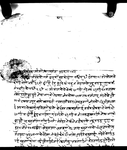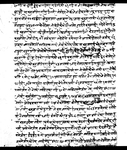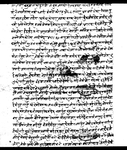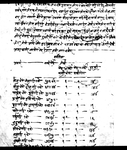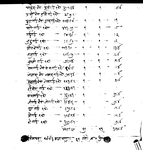A letter from the Mahārājagaṃja Gośvārā Tahabila Aḍḍā formalizing a lokābhāra lease contract for villages in the Doce sector of Aṭhāra Saya Kholā (VS 1993)
ID: L_1200_0009I
Edited and
translated by Rajendra Shakya
in collaboration with
Rabi Acharya
Created: 2019-07-08;
Last modified: 2023-01-24
For the metadata of the document, click here
The accompanying edition, translation/synopsis and/or commentary are available under the terms of the Creative Commons Attribution-ShareAlike 4.0 International License
Abstract
This letter from the Mahārājagaṃja Gośvārā Tahabila formalizes a lokābhāra lease contract for 20 villages towards the Doce sector of the Aṭhāra Saya Kholā region in the name of Chiriṅ Īndu Khunu, detailing the amounts to be submitted by the contractor in cash and kind for each village.Diplomatic edition
[1r-part1]
1श्रीः\[Seal of Mahārājagaṃja Gośvārā Tahabila]1स्वस्तिश्रीमाहाराजगंजगोश्वारातहवील्अडाकस्य¯¯¯ ¯¯¯ ¯¯¯ ¯¯¯ ¯¯¯ ¯¯¯2ङावांसुव्वाकोनातीछाङ्वासुवाकोछोरापश्चीम्२नंईलाका१८सय़ेषोलाप्रो
3कगाऊवस्ने∙वर्ष३२कोछीरीङ्ईन्दु षुनुकेश्रीपकज∙मोहनसम्सेरजङ्गवाहादुरराणाकाषां
4गीमादरीय़ाकोपश्चीं१।२नं१८सय़ेषोलाकोदोचेतर्फ२०गाऊरगाडेतर्फ२३गाऊ९०सालसम्म
5तावेदारहरुलेछुट्टाछुट्टैलोकाभाराकोठेकापट्टालीय़ाकोमा९१सालकावालीलाईगाडेदोचेदुव़ै
6गाभीदार्षासालदुड्वस्न्येभवनाथहीरन्यप्रसादसींषडाहरुलेकवुलगरीलिय़ाको९२।९३सालला
7ईअडावाटडोरषटाईतहसिल्गरेकाले∙य़ो९४सालकावालीलाईसावीकअंकमा∙दोचेतर्फको
8२०गाऊ∙म∙छिरींईन्दुकानाऊमागाडेतर्फको२३गाऊ∙मजीतवाहादुरकानाऊमालोकाभाराको
9छुट्टाछुट्टैपट्टाकवुलीय़ेत्गरीपाऊभनी∙तीमीहरुलेश्रीलेज∙शंकरसम्सेरजङ्गवाहादुरराणाका
10हजुर्मावींतीपत्रचढाऊदा∙सोषुव़ाजगा९१साल्माठेकालाग्दाकवुल्भय़ाको९२साल्मादोरतह
11सीलहुदा∙असुलनभय़ाकोवंदेलर∙नीरवेसीरकंकोरुपैञास्मेत्वुझाऊनेकवुलगर्छरगाडेदोचेगाऊफु
12टाईकवुलगरेकोमापछीदुव़ैगाऊमीलाईठेक्कालीन्छुअसलगाऊली∙कंसल्गाऊछाड्नेछैनभंने
[1r-pt2]
13कवुलिय़ेत्लेषीदीन्छभनेसावीकमा∙गाडेदोचेय़कैपट्टाभैआय़ाकोहोतापनीसावीक्९२
14साल्कालगत्वमोजींतपसिलकानगदीजीन्सीकोठेकअंकमाकवुलगराई९३साल्मातहसि
15लहुदा∙वढनुआय़ेसोवढेकोस्मेत्सकारगरीवुझाऊछुभंनेवोलीपारीदोचेतर्फको२०गाऊ
16कवुल्गर्नेछींरीङ्ईन्दुकोरगाडेतर्फको२३गाऊकवुलगर्नेजीत्वाहादुरकार्कीछेतृकोस्मेत्जो
17चाहीनेवेहोराकोकवुलिय़ेत्गराईली∙९४साल्वर्ष१लाईनीजहरुकानाऊमाछुट्टाछुट्टैठेक्कापट्टा
18गरीदीनुभंने∙य़ेस्अडाकानाऊमाभय़ाकादस्षत्कोसीरमा∙नीरवेसीरकंकोनगदी२५र∙नीरवेसी
19धार्नि१कोरु१०|स्मेत्ज्मामोरु३५|अमानततहसिलहुदा∙तहसिलभैनआय़ेकोलेसोमोरु३५।
20घटाईदी∙७दीनम्यादस्मेत्नटास्नेगरीसदरभंनेतोकथपी९३साल्फागुण१९गते३मासदरभ
21य़ावमोजीम्∙दोचेतर्फ∙तपसिल्कागाऊ२०कोतपसिल्वमोजीम्ठेक्नगदीमोरु४१८८|२०
22रजीन्सी∙कस्तुरीवीना१७पाषीगोटा१३नुनमुरी३|१०|४स्मेत्∙९४साल्माघमैह्नाभरमावुझाऊ
23नेगरीसोठेकवापत्मासर्दार्पक्षवीक्रम्साहाकांतीपुरकालधारालाईधंज्मानीदीकवुली
24य़ेत्लेषीकवुलगरेकोहुनाले∙सोषुव़ाजगाकोईस्तक्सम्वत्१९९४साल्वैसाष१गतेदे
25षीचैत्रमसांततक्वर्ष१लाई∙सीवाय़ेश्रीराजअंककल्याणधनधर्माधीकारपंचषत्रह
26तावहताउडंतागडंतारकमीघरकोझाराजलकरवतकरवेदर्तारकंकलंवाहेक्सावीक्दरी
27चलीआय़ेवमोजीम्व़ाजवीसेर्मासाऊनेफागुघरगतीठेक्दरीचलीआय़ाकारकंकलंगैह्ररअैं
28वमोजीम्∙डंडकुंडमर्योअपुतालीमारीमेटीस्मेत्∙वेमाजरैतपसिल्कागाऊगाऊकोतपसि
29ल्वमोजीम्कोठेक्नगदीमोरु४१८८|२०चारहजारय़ेकसय़ेअठासीरुपैञावीसपैसाजीन्सी
[1r-pt3]
30कस्तुरीवीना१७पाषीगोटा१३तेह्रनुन्मुरि३|१०|४तिंमुरीदसपाथीचारमानास्मेत्९[...]
31सालमाघमैह्नाभरमाचुक्तीपारीवुझाऊनुभाषाकीस्तानाघ्योभनेनगदीरुपैञाकोकीस्ता
32षिलापीसुदस्मेत्रजीन्सीकोपाय़ेजीन्सीनैरनपाय़ेसावीक्दर[?]कोमासोवमोजीम्रदर
33नषुलेकोमाय़ेसअडालाईभय़ाकादरभाऊवमोजीम्नगदीनैवुझाऊनु⟪पर्ला⟫सोषु़वाजगा९३सा
34ललाईअमानत्तहसीलहुनगय़ेकोमा∙हालतीमीलेकवुलगरेकोअंकनगदीजीन्सीभंदावढा
35ईतहसिल्गरे∙जुंकलंमाजेजतीवढहुनआऊछसोवढस्मेत्माथीलेषीय़ाकाभाषाकीस्तामा
36चुक्तीपारीवुझाऊनु९४साल्वर्ष१लाईदोचेतर्फ२०गाऊतीमीलेरगाडेतर्फ२३गाऊजी
37तवाहादुरकार्किछेतृलेकवुलगरीलगेवमोजींअरुसालमालीदापनीसोदुवैगाऊतीमीहरु
38दुव़ैजनालेकवुल्गरीलीनुपर्छअसलगाऊमात्रकवुलगरीकंसल्गाऊछोड्नपाऊदैन
39जगामागैरस्तीचलाईवस्तिवसाईगाऊघरअवादगुलजारराषीअैंवमोजीम्जाईगर्नुवीजा
40ईवीद्दुत्नगर्नुश्रीदेवदेवताकाजात्रादसैपुजामामुलीषर्चस्मेत्केहीगर्नुपर्नेरहेछभनेपनी
41सावीक्वमोजीम्कत्तीनघटाईठेकवाहेक्चलाऊनु∙कवुलवमोजीम्कोरुपैञामादैवीपरीवाजगा
42वाटउठेनभनेपनीकौनैकुरामाय़ेकदाम्मीह्नामोजरापाऊनेछैन∙मामिलामुद्दाईन्साफ
43गर्दा∙अैंवमोजीम्जाईगर्नुवीजाईवीद्दुत्रनञारकंकलंनलगाऊनु∙लेषिय़ावमोजीम्नगरीघ
44टीवढीपारीघुसरोसवतसरसलामीषाईहक्कुराछोडीवेहक्मारैतीदुनिञालाईनञारकंकलं
45लगाईवीजाईवीद्दुत्गरीदुषदीयोभनीकोहीरैतीहरुलेकराऊनआय़ोरठहर्योभनेअैंवमो
46जीम्∙तीमीआफैलेनैवुझाऊनपर्लाभनी१सालाठेक्काकोवाहालीपट्टापुर्जिगरीदीञ्यूं
[1r-pt4]
47आफ्नाषातीरज्मासंगठेक्ईजाराजानीजगाचलंगर¯¯¯ ¯¯¯ ¯¯¯ ¯¯¯
48तपसिल
[table1-part1]
| 1 | असामी | नगदीमोरू | जीन्सी | ||
| 2 | मोरू३०|दर्को कस्तुरीवीना | मोरू५|दर्को पाथीगोटा | नुन्मुरी | ||
| 3 | सोलुभंनेनीलुगाऊ१को | २७२|९१ | १ | १ | |४ |
| 4 | ञीलुभंने∙छीलुगाऊ१को | २८८|४४ | १ | १ | |४|४ |
| 5 | मार्फुक्भंने∙फुर्पेगाऊ१को | २७५|२४ | १ | १ | |४|४ |
| 6 | फुर्पींभंने∙वुर्सिगाऊ१को | २८|७५ | |||
| 7 | छुट्टागाऊभंने∙ङाक्गाऊ१को | १५४|८९ | १ | १ | |१ |
| 8 | पारोगाऊ१को | ४१३|७७ | १ | १ | |८ |
| 9 | पार्छुगाऊ१को | ८०|६९ | १ | १ | |२ |
| 10 | लुदुगाऊ१को | ८८|९७ | १ | १ | |२ |
| 11 | सीपचेगाऊ१को | ११३|३० | १ | १ | |३|४ |
| 12 | ताजुगाऊ१को | १०६|५७ | १ | १ | |२|४ |
| 13 | चुमलीगाऊ१को | ७६|५४ | १ | १ | |१|४ |
[1r-pt5]
[table1-part2]
| 14 | नेपागाऊभंनेमेपागाऊ१को | ६९|८ | १ | १ | |∙|४ |
| 15 | भोलाक्भंनेभलाक्गाऊ१को | ७०|३४ | १ | १ | |∙|४ |
| 16 | नैपागाऊभंनेटोपागाऊ१को | ११३|८२ | १को | १को | |२|४ |
| 17 | रुईवोट्गाऊ१को | २३३|८३ | १ | ||
| 18 | सामागाऊ१को | ३६७|२३ | १ | |७|४ | |
| 19 | लीगाऊभंने∙लोगाऊ१को | ३८४|६ | १ | |७|४ | |
| 20 | छागाऊ१को | ३५७|८२ | |५|४ | ||
| 21 | प्रोगाऊ१को | ३१४|१४ | १ | |५|४ | |
| 22 | वीगाऊ१को | ३७७|८१ | |७|४ | ||
| 23 | ४१८८|२० | १७ | १३ | ३|१०|४ |
49ईतीसम्वत्१९९३साल्फागुण२१गतेरोज५शुभं
Translation
[1r]
[Seal of the Mahārājagaṃja GosvārāTahabila]
Hail! A letter from the Mahārājagaṃja Gośvārā Tahabila Aḍḍā
Āge: To Chiriṅ Īndu Khunu, 32, son of ChāṅvāSubbā and grandson of Ṅāvāṃ Subbā, resident of Prok village of the Aṭhāra Saya Kholā region in West No. 2 disctict.
Up till the year [VS 19]90 (1933 CE) the 20 villages towards the Doce sector and 23 villages towards the Gāḍe sector of the Aṭhāra Saya Kholā region in West Nos. 1 and 2 [respectively?] 1 that are registered as khānagīs of Śrī Commanding General of the Western Front Mohana Śamśera Jaṅga Bahādura Rāṇā were leased separately by subservient persons (tābedāra) as lokābhāra contracts. For crop of the year [VS 19]91 (1934 CE) both Gāḍe and Doce sectors were combined and [jointly] taken on lease by Bhavanātha [and] Hiraṇya Prasāda Siṃkhaḍā, residents of Dārkhā Salāduḍ. As for the years [VS 19]92/93 (1935/36 CE), the collection [of revenue] was done by a team of officers (ḍora) deputed [to the two areas].
As you two have made a petition to Śrī Lieutenant General Śaṅkara Śamśera Jaṅga Bahādura Rāṇā, requesting: “Let there be separate lease contracts in the name of me, Chiriṅ Īndu, for 20 villages towards the Doce sector, and in the name of me, Jīta Bahādura, for 23 villages towards the Gāḍe sector, with the usual rate for the crops of [VS 19]94 (1937 CE),” [he has sent the following instructions:]
"In the case where [both Chiriṅ and Jīta Bahādura] agree to submit the amount due of bandela(?)2 and nirabesī(?)3 rakama as well, which was agreed to be paid [by Bhavanātha and Hiraṇya Prasāda] when the said khuvā land was leased [to them] in the year [VS 19]91, but [was not paid by them and] failed to be collected by the team of officers deputed to make collection in the year [VS 19]92, and if [both Chiriṅ Īndu and Jīta Bahādura] give their consent in writing to accept a lease contract with both sectors (lit. "villages") combined together later, even though a contract has been offered with Gāḍe and Doce sectors (lit. "villages") separately [for this year,] and [pledge that] they will not leave out villages of low grade and accept only villages of high grade, then, even though it is the usual practice to lease out Gāḍe and Doce sectors under a single contract, formalize a separate lease contract of one year for the year [VS 19]94 (1937 CE) in the name of Chiriṅ Īndu, who accepts 20 villages towards the Doce sector and in the name of Jīta Bahādura Kārkī Chetrī, who accepts 23 villages towards the Gāḍe sector in accordance with the regular lagata of the year [VS 19]92, getting them to accept, [within] the contract, making payment at the same stated [rate] in cash and kind as mentioned in the tapasila below [for each village], and also making them state: 'In the case where there is an increment [in the amount required to be collected] within the duration of the year [VS 19]93, we shall accept and submit the said increment as well,' and get [both of them to sign] a deed of lease, stating other necessary details.
"In accordance with the authorization (daskhata) issued4 in the name of this aḍḍā, formalize a lease contract for 20 villages mentioned below situated towards the Doce sector at 4,188 mohararupaiyā̃s 20 paisā in cash, along with 17 musk pods, 13 pākhīs and 3 murīs, 10 pāthīs 4 mānās of salt in kind, which are to be submitted within the month of Māgha in the year [VS 19]94 (1938 CE). [However,] there shall be an exclusion (lit. "reduction") of 35 mohararupaiyā̃s 1 sukā, since a total of 35 mohararupaiyā̃s 1 sukā, which comprises a cash sum of 25 [mohararupaiyā̃s] as the nirabesī(?) rakama and 1 dhārnī of nirabesī (?) [worth] 10 mohararupaiyā̃s 1 sukā, was not collected when attempts were made to collect it under the amānata [system].
"In accordance with approval given on Tuesday, the 19th of Phālguṇa in the year [VS 19]93 (2 March 1937), [a line] shall be added for the sanction [of the lokābhāra lease contract] which shall state: ‘approved without a seven-day deadline notice having been posted.'
"As the deed of lease was accepted [by the contractors] by submitting collateral for the said lease contract to SardāraPakṣā Vikrama Śāha of Kāladhārā in Kāntipura (Kathmandu), the said land [registered as] khuvā [of the Commanding General of the Western Front Mohana Śamśera] shall, for a period of one year beginning from (istaka) the 1st of Vaiśākha to the end of Caitra of the [Vikrama era] year 1994, receive a complete exemption on [all liabilities]—the scheduled sermā, sāune phāgu, household (gharagatī?)5 leases, registered customary taxes and levies (rakamakalama) and the like, and also, in accordance with the Ain, on daṇḍakuṇḍa and maryo-aputālī; but not on rāja-aṅka, kalyānadhana, dharmādhikārapañcakhata, arrearages (rahatā, bahatā, uḍaṃtā, gaḍaṃtā)6 , jhārā levies on rakamī households, jalakara7 , vatakara8 , [and] unregistered customary taxes and levies (rakamakalama).
"You shall submit within the month of Māgha in the [Vikrama era] year [19]9[4] in full a total sum of 4,188.20 mohararupaiyā̃s, [in words] four thousand one hundred eighty-eight rupees twenty paisas, in cash and 17 musk pods, 13 pākhīs and 3 murīs, 10 pāthīs, 4 mānās (three murīs, ten pāthīs, four mānās) of salt in kind as mentioned below for the villages listed. If [the deposit of] the instalment crosses the deadline, you shall have to pay interest as well as the cash instalment. Deposit the [said] goods themselves if those goods are available; if not, then you shall have to pay for the goods in cash at the going rate if the rate is known. If the rate is not known, you shall have to pay in cash at the rate available to this aḍḍā.
"Although [a certain amount] was collected under the amānata system in the year [VS 19]93 (1936 CE) for the said khuvā land, submit the above-mentioned instalment [in cash and kind within the] deadline in full, along with any increment [in the collection made] on any title (lit. 'column') if you manage to collect any revenue (aṅka) additional to what now you have agreed [to submit] in cash and kind. Both of you shall have to accept [a lease contract] for the said two sectors (lit. 'villages') while accepting [such contracts] also in the following years in the same manner as you have accepted the 20 villages towards the Doce sector and Jīta Bahādura Kārkī Kṣetrī has accepted the 23 villages towards the Gāḍe sector for the one year of [VS 19]94 (1937 CE). You shall not accept only high-grade villages and leave out low-grade villages.
"Go to the land [assigned] and oversee affairs, found settlements and make villages, households and crops flourish, and follow [thereby] the rules set by the Ain. Do not cause injury or oppression. Besides [the commitments] under the contract, in the case where there is a need to cover ordinary expenses for religious processions of the glorious deities or for worship during the Dasaĩ festival, you shall do so [from your own households] without any reduction in the previous outlay.
"You shall not receive remission of even a single dāma on the amount contracted to be paid for any reason, whether due to any natural disaster or that you failed to collect [what is due] on [lokābhāra] land. Follow the rules set by the Ain while adjudicating lawsuits and delivering justice. Do not cause injury or oppression or impose new levies.
"If you do not act in accordance with what is written here and go against it by taking bribes or embezzling sarsalāmī payments, disregarding rightful issues and unlawfully imposing and collecting new levies, or [otherwise] causing injury and oppression so as to make ryots suffer, and if any ryot comes to complain and [such wrongdoing] is proven, then you shall have to pay [the penalty] yourself in accordance with the Ain.
"We have thus signed a purjī [that formalizes] the contract that marks the commencement of a one-year lease. Be informed that it is a lease contract and tend the land with content."
Details (tapasila)
[table1]
| Entry (asāmī) | Mohararupaiyā̃s in cash | Goods | |||
| Musk pods @ 30 mohararupaiyā̃s | No. of pākhī @ 5 mohararupaiyā̃s | Salt in murīs | |||
| The 1 village of Nilu known as Solu | 272.91 | 1 | 1 | 4 pāthīs | |
| The 1 village of Chīlu known as Ñīlu | 288.44 | 1 | 1 | 4 pāthīs 4 mānās | |
| The 1 village of Phurpe known as Mārphuk | 275.24 | 1 | 1 | 4 pāthīs 4 mānās | |
| The 1 village of Bursi known as Phurapīṃ | 28.75 | - | - | - | |
| The 1 village of Ṅāk known as Chuṭṭā Gāũ | 154.89 | 1 | 1 | 1 pāthī | |
| The 1 village of Pāro | 413.77 | 1 | 1 | 8 pāthīs | |
| The 1 village of Pārchu | 80.69 | 1 | 1 | 2 pāthīs | |
| The 1 village of Ludu | 88.97 | 1 | 1 | 2 pāthīs | |
| The 1 village of Sīpace | 113.30 | 1 | 1 | 3 pāthīs 4 mānās | |
| The 1 village of Tāju | 106.57 | 1 | 1 | 2 pāthīs 4 mānās | |
| The 1 village of Cumalī | 76.54 | 1 | 1 | 1 pāthī 4 mānās | |
| The 1 village of Mepā known as Nepā Gāũ | 69.[0]8 | 1 | 1 | 4 mānās | |
| The 1 village of Bhalāk known as Bholāk | 70.34 | 1 | 1 | 4 mānās | |
| The 1 village of Ṭopā known as Naipā Gāũ | 113.82 | 1 | 1 | 2 pāthīs 4 mānās | |
| The 1 village of Ruiboṭ | 233.83 | 1 | - | - | |
| The 1 village of Sāmā | 367.23 | 1 | - | 7 pāthīs 4 mānās | |
| The 1 village of Lo known as Lī Gāũ | 384.[0]6 | 1 | - | 7 pāthīs 4 mānās | |
| The 1 village of Chā | 357.82 | - | - | 5 pāthīs 4 mānās | |
| The 1 village of Pro (Prok?) | 314.14 | 1 | - | 5 pāthīs 4 mānās | |
| The 1 village of Bī (Bihi?) | 377.81 | - | - | 7 pāthīs 4 mānās | |
| [Total] | 4188.20 | 17 | 13 | 3 murīs, 10 pāthīs 4 mānās | |
Commentary
This letter from the Mahārājagaṃja Gośvārā Tahabila Aḍḍā formalizes a lokābhāra lease contract for 20 villages towards the Doce sector of the Aṭhāra Saya Kholā region in the name of Chiriṅ Īndu Khunu. A similar letter seems to have been issued in the name of Jīta Bahādura Kārkī Chetrī, who received a lokābhāra lease contract for 23 villages towards the Gāḍe sector of the same region, it being mentioned in the present letter that both Chiriṅ Īndu and Jīta Bahādura submitted collateral to Sardāra Pakṣā Vikrama Śāha of Kāladhārā in Kathmandu in order to obtain their lease contracts. Although the office Śāha served in is not obvious from the document, it is clear from his designation that he was a high-ranking officer. It appears there were certain high-ranking officers designated to accept, probably on behalf of the government, collateral from parties concluding lease contracts.
While most earlier documents dating from the late 1800s obtained from the area show that lokābhāra lease contracts were formalized by the holder of the khānagī himself, this one was formalized by a Gośvārā Tahabila Aḍḍā, the holder of the khānagī, Commanding General of the Western Front Mohana Śamśera, having seemingly been uninvolved in any of the process of leasing the lands allocated as his khuvā. Most of the earlier documents formalized lokābhāra contracts without requiring any collateral or the posting of a seven-day deadline notice. Even if the latter provision was not imposed in the present case, however, the contractors did have to submit collateral. Another fact this document bears witness to is that there was a practice of collecting levies by deputing a team of officers (ḍora) to places when there was no one else to officially do so and submit the sum to the concerned person.

